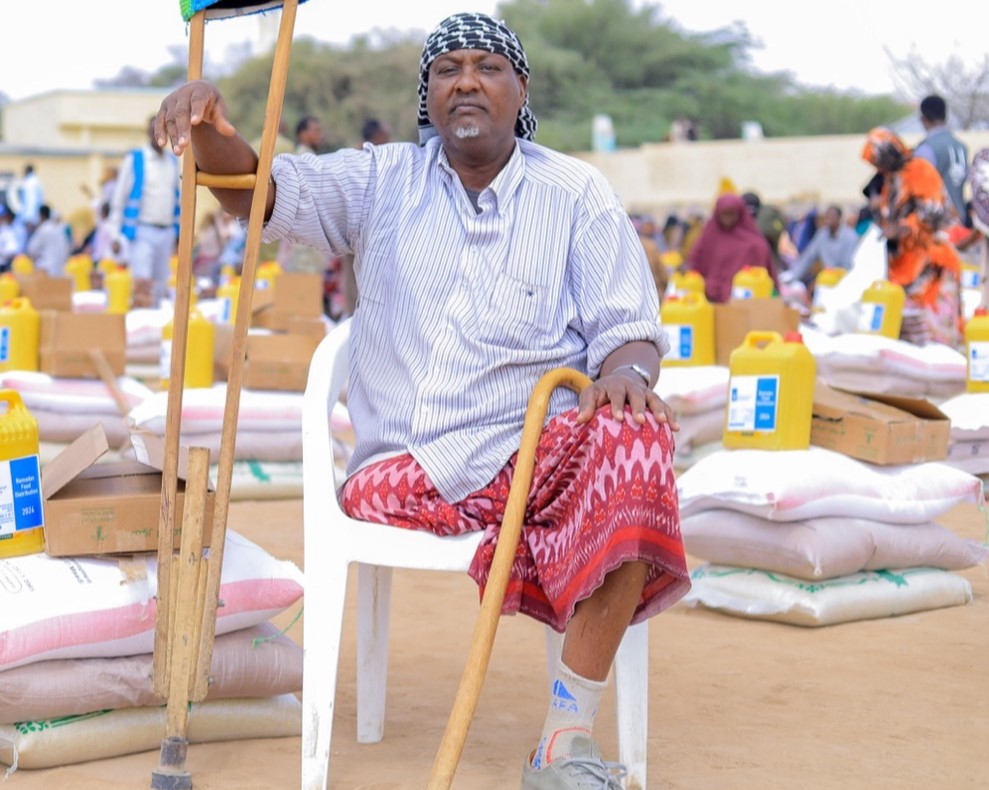
As the world recognises the International Day of Persons with Disabilities, those living in the world’s poorest communities can find life particularly challenging. In Somalia, where recurring droughts and skyrocketing food prices leave millions struggling, people with disabilities face a daily battle for survival.
Dirie, 55, lost his right leg in 1990 during Somalia’s civil war. “Since then, my brothers and extended family have been my lifeline, providing what little food and water they could,” he says.
But, as drought continues to ravage his community in Hargeisa district, every day is a test of its members’ resilience, and Dirie’s family are finding it harder and harder to make ends meet.
Dirie’s story echoes what is happening to thousands of people with disabilities across Somalia, who are dealing not only with physical limitations, but also with the economic burden caused by climate change and conflict in one of the world’s poorest countries. For those already marginalised, drought is worsening existing vulnerabilities, pushing many to the edge of survival.
A crisis intensified by climate change
Somalia has long been at the mercy of extreme weather, but recent droughts have reached unprecedented levels of severity, wiping out crops and livestock and depleting water supplies. As crops wither and animals die, many people in the communities worst affected have lost the means to produce their own food and lack the resources to buy it.
“The drought has destroyed our ability to access food and water,” Dirie explains. The small items his wife is able to sell in local markets cannot provide enough income to cover their basic needs.
“The combination of global inflation and prolonged drought has worsened an already critical situation,” says Abdirahman Ahmed, one of Islamic Relief’s programme officers in Somalia. “People with disabilities are particularly vulnerable because they often lack access to resources and face additional challenges when it comes to receiving aid.”
In response, Islamic Relief has been distributing essential food packs to vulnerable households across Somalia. So far this year, 850 families have received supplies such as rice, wheat flour, sugar, and cooking oil. Fifty of the families who have benefited include someone with a disability, as we strive to ensure that those most in need get the help they require.
Barriers to access
Despite our efforts, accessing food aid can be a challenge for people with disabilities. Distribution sites are often crowded, making it difficult for people with limited mobility to collect their supplies. “Carrying heavy food packs is hard for me,” Dirie explains. “I recently had surgery on my kidney, which makes it even more difficult.”
Abdirahman says Islamic Relief is working to improve accessibility. “We’ve observed that individuals with disabilities face significant obstacles on distribution days,” he explains. “That’s why we’re planning to introduce new distribution sites that are more accessible for them.”
Beyond physical barriers, there are social and economic challenges that make life difficult for people with disabilities. Many rely on their families or local networks for support, but that support can be hugely overstretched in times of crisis.
When a family’s income is meagre and unreliable, it becomes a real struggle to make ends meet. “Sometimes we manage only 2 meals instead of 3,” Dirie says.
Inclusive aid is essential
Islamic Relief’s is determined to provide inclusive aid across Somalia – support that does not leave those with disabilities and other vulnerable people behind. We are working closely with local agencies and with organising committees in camps for displaced people to ensure that aid reaches the most vulnerable, prioritising those who cannot easily access food or healthcare.
“One hundred per cent of Islamic Relief’s aid goes to the most vulnerable communities,” says Abdirahman. “We carefully select families who are unable to provide three meals a day.”
While these efforts are having a positive impact, Dirie believes that more aid is needed to support more families like his. “This support brings us happiness and helps us survive. But expanding your programme to reach more families with members who have disabilities would be a great blessing.”
A call for greater support
On this International Day of Persons with Disabilities, Dirie’s story shows us that humanitarian aid cannot be delivered effectively in a regimented, one-size-fits-all way. There is a pressing need for support that meets people where they are, including people with disabilities in places like Somalia. Small but impactful changes, such as establishing accessible distribution points, can make a world of difference for those already facing daunting obstacles.
As Somalia’s disabled population endures hardships most of us can hardly imagine, the call for global solidarity and inclusive support grows louder. Dirie’s words resonate deeply: “I pray that Allah rewards and supports all who help us. May you continue this work and reach even more families in need.”
Through Islamic Relief’s efforts, people with disabilities in Somalia are finding the strength to survive, despite the hardships they face.
This International Day of Persons with Disabilities, let us remember their resilience and commit to creating a world that cares for everyone, especially the most vulnerable. Together, we can create lasting change and ensure that no one is left behind.
Islamic Relief works with local communities in many countries to provide relief from the devastating effects of climate change, empowering vulnerable people to adapt to the challenges it brings. Donate today to support our vital work.



